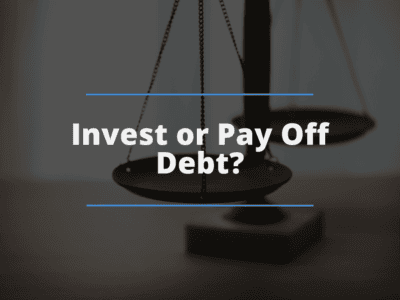The question of whether to invest or pay off debt aggressively is one that plagues many of us. On the one hand, the potential growth of investments is incredibly tempting. But on the other, the burden of debt, with its nagging interest payments, can feel suffocating. So, how do you decide the best path for you? There’s no simple answer, but this guide will arm you with everything you need to make a smart, personalized choice.
Defining the Key Terms
Let’s lay the groundwork.
Debt
When we talk about debt, we mean money you owe. This could be high-interest credit card debt, student loans, a mortgage, car loans, or even personal loans. Each type carries different interest rates and implications.
Investing
This involves putting your money into assets with the hope of them growing in value over time. Popular options include stocks (shares in a company), bonds (essentially loans to companies or governments), mutual funds (baskets of stocks or bonds), and retirement accounts like 401(k)s or IRAs.
Factors That Determine the Best Choice for YOU
There’s no one-size-fits-all answer when it comes to investing vs. paying off debt. Here’s what matters most:
Interest Rates
This is the biggie!
High-interest debt
If you’re carrying credit card balances with rates upwards of 15%, it almost always makes sense to tackle that debt first. The interest you’re paying far outweighs what you’d realistically earn in the stock market.
Lower-interest debt
With mortgages or student loans at lower rates, the decision gets trickier. If you believe you can earn a higher return from investing than the interest on your debt, investing could be a wise move.
Personal Risk Tolerance
Stocks or funds go up and down; are you okay with that volatility?
Do you lose sleep over debt, even if paying it off slowly makes less financial sense? Peace of mind is worth factoring in!
Financial Goals
Urgent needs: If you’re saving for a down payment or lack an emergency fund, debt repayment might take priority.
Retirement: The earlier you invest, the better. Missing out on years of compounding is extremely costly in the long-term.
The Power of Compound Interest (Why Investing Matters)
Compound interest is like a snowball rolling downhill. It starts small, but as it gains momentum, it grows exponentially. Here’s the gist:
- You invest money, and it earns a return. That return gets added to your original investment.
- Now, in the next period, you earn a return on the larger amount (original investment + previous return).
- This keeps snowballing, leading to truly impressive long-term growth.
Example: If you invest $1,000 at a 7% average annual return, here’s the magic:
- After 10 years: ~$2,000
- After 20 years: ~$4,000
- After 30 years: ~$8,000
That’s without investing another dime! Missing out on this growth by delaying investment to pay off low-interest debt can be a costly missed opportunity.
Is Doing Both Possible?
Absolutely! A balanced approach might be the perfect middle ground for many people. Here’s what this could look like:
- Prioritize tackling high-interest debt.
- Make minimum payments on lower-interest debt.
- Invest a smaller, yet consistent amount (even $50 a month makes a difference over time!).
- Robust emergency fund: Have this in place before aggressively pursuing either investing or debt repayment.
Specific Cases and Examples
Let’s make this real with a few scenarios:
The Burden of High-Interest Credit Card Debt
Let’s say you have $5,000 in credit card debt with a 18% interest rate.
If you only pay the minimum, it’ll take years to repay and cost you thousands in interest. Aggressively focusing on the debt is the clear winner here.
Mortgage Interest vs. Potential Investment Returns
You have a mortgage with a 4% interest rate. With responsible investing, you could average a higher return long-term. This is where a balanced approach (some debt repayment, some investment) likely makes sense.
Balancing Student Loan Debt with Retirement Savings
A tricky one! Prioritize minimum payments on your student loans, ensuring you’re at least getting any employer-match in retirement accounts (i.e., in a 401(k)). Gradually increase investing as your income allows.
Practical Steps to Take
Feeling overwhelmed? Let’s break it down into actionable steps:
- Assess your current financial picture:
- Make a list of every debt: the amount, interest rate, and minimum payment.
- Tally up your current savings and investments.
- Track your income and expenses to get a clear budget picture.
- Create a budget (if you don’t already have one): This is crucial for identifying where you can allocate money to either debt payments or investments. Many free budgeting tools are available like Simplifi or YNAB.
- Consider consulting a financial advisor: Especially if your situation is complex (multiple debts, complex investments), a professional can provide tailored advice and ease your decision-making burden.
Additional Things to Consider
A couple more factors that can play a role in your decision:
Employer-matched retirement contributions
If your employer offers this, prioritize getting the full match. It’s essentially “free money” for your future!
Tax implications
Interest on student loans or your mortgage may be tax-deductible. This can tilt the scales in favor of keeping that debt a bit longer while maximizing other opportunities.
Conclusion
There’s no single “right” answer to the invest-or-pay-off-debt question. The best choice depends on your individual circumstances, goals, and personality. This guide hopefully provides a solid framework for making a decision that brings you confidence and aligns with your long-term financial well-being.
Always seek more information and consult professionals when needed. Your future self will thank you!
